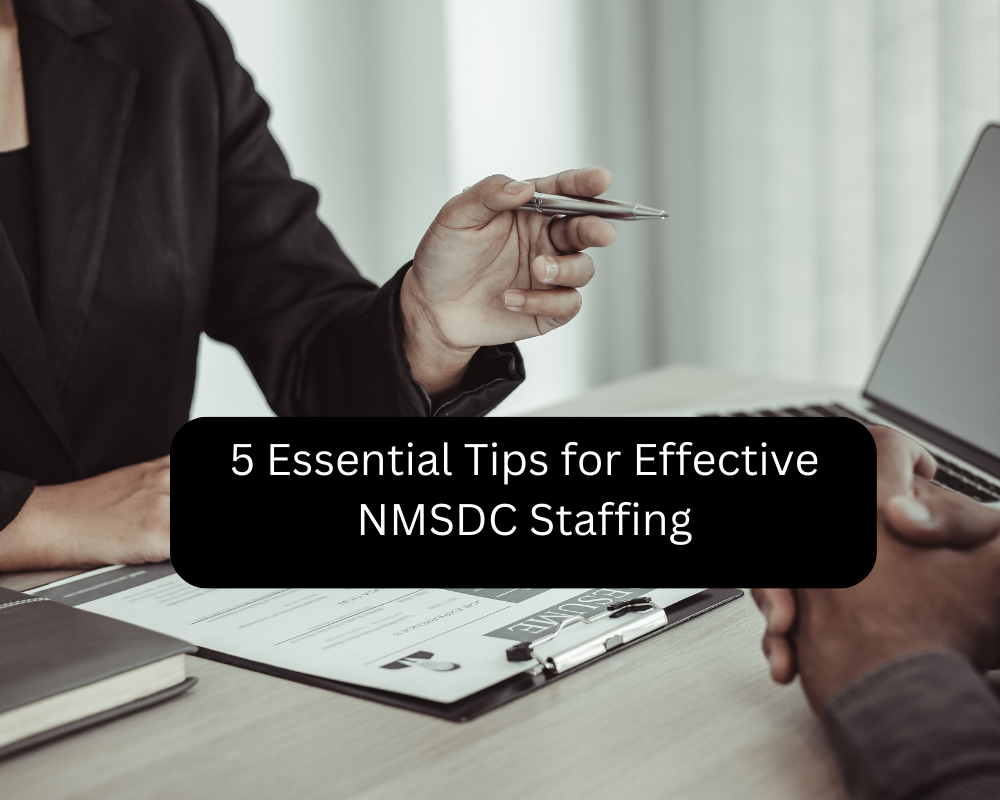Navigating the world of staffing, particularly within the framework of the NMSDC (National Minority Supplier Development Council), poses unique challenges and opportunities. In this detailed guide, we dive into the core strategies for effective staffing under this paradigm, drawing from real-life experiences and an analytical perspective.
Understanding the NMSDC Landscape
Before delving into strategies, it’s crucial to grasp the NMSDC landscape. This council focuses on advancing business opportunities for certified minority business enterprises and connects them to corporate members. In the staffing realm, this translates to a focus on diversity and inclusion, not just as a compliance measure, but as a strategic business advantage. While finding the Right Esthetician for Your Skincare is important, effective NMSDC staffing ensures qualified minority and women-owned businesses contribute to your spa’s success.
Tip 1: Embrace Diversity as a Strategic Advantage
In my experience, companies that see diversity in their workforce as a strategic advantage tend to outperform their peers. This isn’t just about filling quotas; it’s about bringing a variety of perspectives and ideas to the table. When looking for NMSDC Staffing solutions, prioritize agencies that don’t just understand this concept but embody it in their recruitment and management practices.
Incorporating Diversity in Recruitment
Recruitment should go beyond the traditional channels. Explore minority-focused job fairs, forums, and online platforms. Engage with communities and educational institutions that serve a diverse population. This approach not only widens your talent pool but also demonstrates your commitment to inclusive hiring.
Tip 2: Invest in Cultural Competence Training
Staffing successfully in this domain requires more than just hiring diverse talent; it necessitates an environment where all employees feel valued and understood. I recall a client who saw a significant improvement in team performance after implementing regular cultural competence training. An addiction treatment center can benefit from effective NMSDC staffing by creating a more diverse and culturally competent environment for patients. Such initiatives help in creating an inclusive atmosphere where diverse talents can thrive.
Building an Inclusive Culture
It’s one thing to bring diverse staff on board; it’s another to ensure they feel part of the team. Regular team-building activities, celebrating different cultures, and having a zero-tolerance policy for discrimination are essential steps toward building an inclusive culture.
Tip 3: Leverage Technology and Data
In today’s data-driven world, leveraging technology in staffing can give you a competitive edge. Analytical tools can help identify gaps in diversity and guide recruitment efforts. Moreover, technology can aid in removing biases from the hiring process, ensuring a more equitable selection process.
The Role of Data Analytics in Staffing
By analyzing workforce data, you can make informed decisions on where to focus your diversity efforts. This might involve identifying departments with lower diversity ratios or understanding the career progression of minority employees within your organization.
Read: The Science of Beauty Sleep: How Rest Impacts Your Health and Appearance
Tip 4: Foster Strong Relationships with Minority Communities
Building relationships with minority communities and institutions is a long-term strategy that pays dividends. Participate in community events, sponsor minority-led initiatives, and collaborate with minority education institutions for internships and job fairs. These actions help in building a positive brand image and make your organization an attractive destination for diverse talent.
Real-Life Example: Community Engagement
A company I worked with significantly improved its minority hiring by actively engaging with local communities and educational institutions. They sponsored events, provided mentorship programs, and created internship opportunities, which not only helped in staffing but also enriched their corporate culture.
Tip 5: Measure, Analyze, and Improve
Lastly, any strategy’s effectiveness is only as good as its measurement and analysis. Regularly track key metrics like diversity ratios, employee satisfaction scores among minority employees, and retention rates. Use this data to continuously refine your strategies.
Continuous Improvement Through Feedback
Encourage feedback from your staff, especially from minority groups. This can provide valuable insights into what’s working and what’s not, allowing for continuous improvement in your staffing practices.
Conclusion
Effective NMSDC staffing is not just about meeting diversity quotas; it’s about recognizing the value of a diverse workforce and implementing strategies that foster an inclusive, productive, and happy work environment. Effective NMSDC staffing can present Challenges in Mental Health due to the pressure to manage diverse supplier relationships and ensure compliance. By embracing these tips and continuously refining your approach based on real-world feedback and data, your organization can excel in creating a truly inclusive and dynamic workforce.
Final Thoughts
The journey to effective NMSDC staffing is ongoing and evolving. It requires commitment, flexibility, and a willingness to learn and adapt. By implementing these strategies, you’ll be well on your way to not just meeting diversity objectives but also enriching your organizational culture and enhancing your competitive edge in the market.



